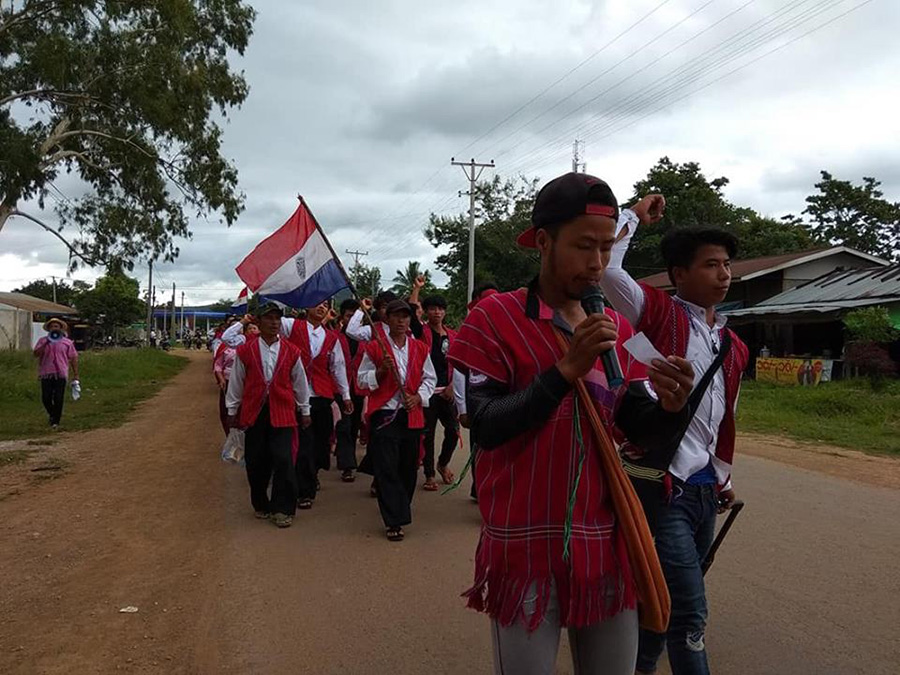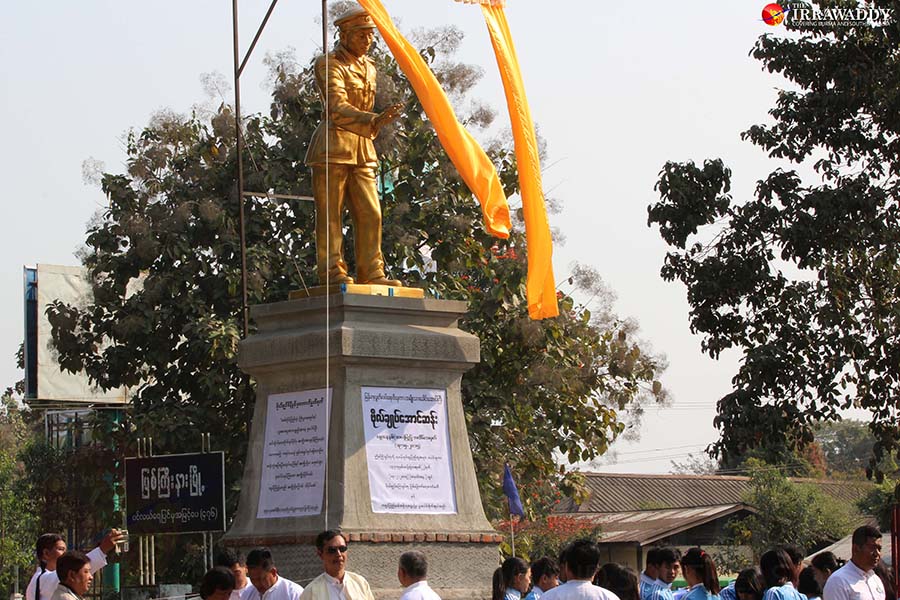YANGON — Political activists and analysts have called on the Union government to put a stop to the trend of local governments putting up statues of General Aung San in ethnic states, amid mounting public opposition to the practice.
Political analyst Dr. Yan Myo Thein said putting up statues of Gen. Aung San in ethnic states over the objections of local people threatened to disrupt unity, trust and understanding between the majority Bamar population and other ethnic groups.
“The Union government needs to stop this,” he added.
Disputes over plans to put up statues have grown increasingly heated in recent years, as the state governments have ignored local ethnic people’s objections.
In the latest incident, about 1,000 people in Karenni State marched to protest against the state government’s plan to put up a statue of Gen. Aung San in the state capital, Loikaw.
Before the protest, local youth groups sent an open letter to the state government on June 18 requesting to meet with authorities in order to negotiate the issue.
When the request went unanswered, demonstrators went ahead with Tuesday’s protest, which turned violent. In addition, 11 youths face prosecution for distributing pamphlets opposing the statue-building project and discussing the history of Karenni State last month. Township authorities sued the youths for alleged incitement under Article 505 (b) and (c) of the Penal Code.

Several youth groups and student unions denounced the crackdown and lawsuit as well as the arbitrary construction of [a statue of] Gen. Aung San.
Since 2015, there have been protests in Chin, Mon and Kachin states; regions with large Bamar populations have not seen the same level of opposition.
Gen. Aung San, the father of State Counselor Daw Aung San Suu Kyi, is regarded as the country’s independence hero for his struggle to free the country from British colonial rule 70 years ago. Before the country gained independence, Gen. Aung San and ethnic leaders signed the 1947 Panglong Agreement, which enshrined federalism and equal rights for ethnic nationalities. But 71 years after the general’s death, those pledges remain unfulfilled.
“With his spirit, vision, and what he did [for the country], Bogyoke [General] is an inspirational person for all youth. But being inspirational for us doesn’t necessitate putting his statue here. We have our own respected ethnic heroes,” Khun Thomas from the Kayan New Generation Youth (KNGY) group, an organizer of the protest in Karenni State, said.
He added that instead of erecting a statue of Gen. Aung San, the government should fulfill the promises he made.
State governments say such statues honor Gen. Aung San and serve to preserve his legacy and create a reminder of the spirit of the Union he created.
“They should build the statues only in areas where there is no objection. It is nonsense, building the statues over the locals’ objections,” ethnic affairs observer U Mg Mg Soe said.
He said that when it comes to ethnic-related issues, the ruling National League for Democracy (NLD) should take a careful and serious approach. Anti-statue sentiment is not confined to one ethnic region; it is happening in many places, he said.
“As long as we continue to erect statues instead of delivering on the promises of the Panglong Agreement, it will cause problems. The NLD will also face a decline in support, especially in ethnic states,” he said.
In the April 1 by-election, the NLD lost a Lower House seat in Mon State’s Chaungzon Township to the Union Solidarity and Development Party—the military backed, former ruling party—after its controversial naming of a bridge after Gen. Aung San.
Yet, NLD spokesperson U Myo Nyunt said on Wednesday that in a political activities report presented at its nationwide congress in Yangon last month, the party stated that the celebrations of the centennial of Gen. Aung San’s birth in 2015 contributed significantly to its landslide victory in that year’s general elections.
But he said the party has no policy on the issue and had not instructed the states and regions to build Gen. Aung San statues.
Party members are involved in the activity because they believe it is important to have memorials to him. Thus, he said, local residents paid for the statues out of their own pockets to help future generations remember his spirit and actions.

If Gen. Aung San, who was known for his modesty, were alive today, he would not be happy that his admirers were building statues instead of prioritizing the needs of local people, political analyst Dr. Yan Myo Thein said.
NLD Lower House lawmaker Ma Zin Mar Aung seconded that view.
“It is more important to implement the Bogyoke’s spirit and vision than erecting statues [of him],” she said.
“Spending the state budget on statues shouldn’t be done without the consent of the local ethnic people. Instead, the budget could be better used for development projects that benefit locals,” Ma Zin Mar Aung said.
Karenni State—one of the country’s poorest—reportedly allocated a budget of 80 million kyats (US$56,890) for its statue of Gen. Aung San.
Women’s rights and peace activist Ma May Sabe Phyu said the government should back up its rhetoric on national reconciliation and equal rights with action.
“Speaking as a member of an ethnic minority group, no one hates Bogyoke Aung San. There is no reason for that. But these arbitrary statue constructions will only provoke opposition. If they allow the Bogyoke Aung San statues, they also need to allow statues of ethnic minority leaders. Everyone wants to commemorate their own respected leaders. They need to understand that,” she said.

















